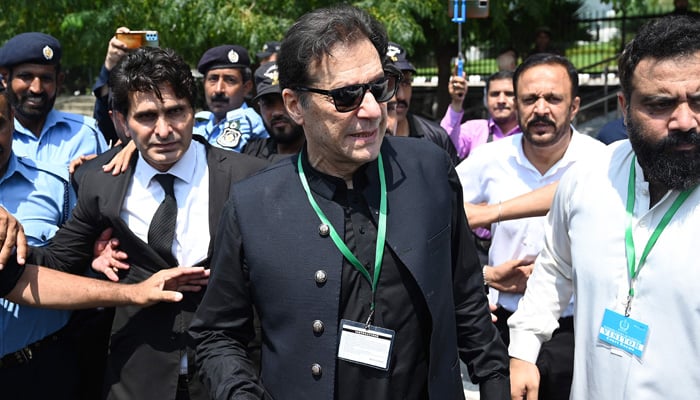ISLAMABAD: As he remains behind bars in Khyber Pakhtunkhwa’s Attock jail, Pakistan Tehreek-e-Insaf (PTI) Chairman Imran Khan has been grilled by a special Joint Investigation Team (JIT) probing the May 9 rampage across the country after permission granted by an anti-terrorism court (ATC).
The court has allowed Khan to be interrogated by the police in six more cases.
The JIT, which comprises a five-member high-ranking team, visited the Attock Jail a day earlier to question the PTI chief — who is currently serving a three-year sentence after being convicted in the Toshakhana case — in different cases, for which he has been booked under sedition and anti-terror laws.
During interrogation, the former prime minister — who was ousted from office after a no-confidence motion against him in April 2023 — was probed on the addition of offences under sections 121 (waging or attempting to wage war or abetting waging of war against Pakistan), 131 (abetting mutiny, or attempting to seduce a soldier, sailor or airman from his duty) and 146 (rioting) mentioned in the first information report (FIR).
Other offences, under which Khan was grilled, include sections 120, 120-A, 120-B, 121-A, 505, 153, 153-A, 153-B and 107 of PPC for his alleged involvement in attacks on Askari Tower, Shadman police station, and torching of Pakistan Muslim League-Nawaz’s (PML-N) offices in Lahore’s Model Town and Jinnah House, which also serves as the corps commander’s residence.
The DIG (Investigations), Lahore, who is the convener of the JIT, had sought permission to interrogate and arrest the PTI chief in an FIR registered by the police regarding the attack on Jinnah House.
The May 9 riots were triggered almost across the country after the deposed prime minister’s arrest in the £190 million settlement case. Hundreds of PTI workers and senior leaders were put behind bars for their involvement in violence and attacks on military installations.
During the protests, the miscreants targeted the civil and military installations including — Jinnah House and the General Headquarters (GHQ) in Rawalpindi. The military termed May 9 “Black Day” and decided to try the protesters under the Army Act.
To probe Khan for the violence that ensued, the police had added the provisions on August 18 as per the case diary after which it contacted the anti-terrorism court seeking permission to investigate the PTI chief.
The court’s Judge Ejaz Ahmad Buttar, consequently, issued an order at the request of the police



Comments are closed.